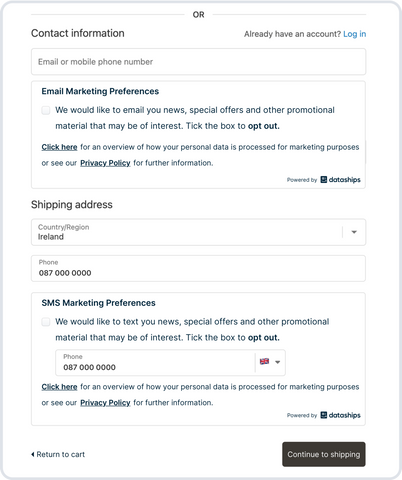In the evolving digital landscape, the importance of online privacy is gaining significant traction. The continued growth of online browsing and transactions has seen protocols, such as GDPR in the EU, introduced in a bid to protect consumers. However, there are calls for users to have more control over how their data is being used and transparency into who is collecting it and for what purposes.
Third-Party Cookies
As online browsing and purchasing has grown so has the use of third-party cookies. When users browse a website, third-party cookies from domains other than the one the user is interacting with, are placed on the users' device. They then track the user's browsing history and activities so they can deliver targeted ads of products and services to this user from here on in.
Over the last number of years, users have been given more control over what cookies they accept on websites. Originally cookies were used very simpy, so websites knew if users were new or returning visitors. However, it wasn’t long until this humble cookie morphed into something greater and now it sits as a core part of the multi-billion dollar industry.
Over time new compliance and regulation around cookie use has been introduced. Originally once a website informed users about cookies used on the website they did not have to request further consent. This offered a blanket consent, which many companies could hide behind to install cookies on people’s devices.
Nowadays, due to changes in regulations, most websites will offer you the option to accept all cookies or just the essentials or reject them outright. Users should also be able to click further into these consent boxes to find out what other companies are deploying cookies. Here, they can find further options to opt-out. However many users still want more control and transparency over who has access to their data and how it is being used.
The Solution: Owned Data
In a bid to give consumers more control over their data and to comply with data protection laws globally, Google has announced plans to remove third-party cookies from Chrome. They are planning to implement this fully in 2024. Third-party cookies are already blocked by default in Apple Safari and Mozilla Firefox.
If you have relied on third-party data to drive growth, you’re probably wondering how you can plug this gap in your reach. As online engagement continues to shift from platforms like Facebook to a privacy-first approach, owned data will help adapt your marketing efforts. First-party cookies only attain data from the site the user accessed as opposed to the third party companies that users do not have a direct relationship with. From this users will have greater control over who is retaining their data as there will not be third party companies hiding behind the facade of one website.
Benefits of First-Party Cookies
First-party cookies are generally considered less invasive by end users since they are set by the website itself and are typically used for functionality such as login details and preferences. These are usually helpful features that a user will opt into as they improve the user experience on a site.
Regulatory bodies like the General Data Protection Regulation (GDPR) in the EU and the California Consumer Privacy Act (CCPA) have imposed strict requirements on how companies collect and use data. Embracing first-party cookies can help businesses ensure they are compliant with these regulations by prioritising transparency and giving user control over their personal information.
Why you should prioritise owned data
As online advertising moves away from third-party cookies, prioritising owned data will help you adapt your marketing efforts. An effective owned data strategy provides actionable insights that become more accurate over time – unlike third-party data which degrades – as you build trust with your customers and interact more.
How can you do this?
Prioritising owned data starts with looking at your website. Consider the places you are collecting personal data such as emails and SMS and ensure they are configured correctly.
One key consideration is your MCR (marketing consent rate). Your MCR is the metric for all the people you are collecting personal data from, what % of them are consent to marketing.
Take the checkout for example. Do you know what your MCR is? If you are a Shopify store using their default configuration, we know that on average your MCR is 22%. That means you can market to 2 out of 10 customers who purchase from you. But what about the other 8 customers?

You are hamstringing your growth by using Shopify’s consent collection and instead, you should be looking to optimise this collection point.
At StudioForty9, we partner with Dataships who are experts in marketing compliance. With their in-house compliance team and Shopify app, they have been able to ensure the Studioforty9 clients are compliant, they have also been able to significantly grow their MCR.
On average, with Dataships, the MCR at the checkout with their app is 88%.
That means you go from being able to market to 2 out of 10 customers to 9 out of 10 customers!
Your brand and Studioforty9 do a great job in getting potential customers to your website, you both then do an amazing job in converting these potential customers into paying customers. This is where Dataships comes in, they ensure you can market to as many of those customers as possible, turning them into repeat purchasers.
It is much cheaper to retain an existing customer, than it is to acquire a new customer and with Dataships they ensure you can do this.
About Dataships
Dataships is a Shopify app that integrates with Klaviyo. They can look after both your email and SMS consent collection by using the different data privacy rules and local legislations to the ecommerce stores advantage.
By using geo location technology the app is able to identify where the purchaser is coming from and present them with the most optimised and compliant consent collection wording to ensure you can collect as many marketable contacts as possible.
Reach out to StudioForty9 to see how we can help you get the most out of your data and reach your target audience with the aid of great tools such as Dataships.




